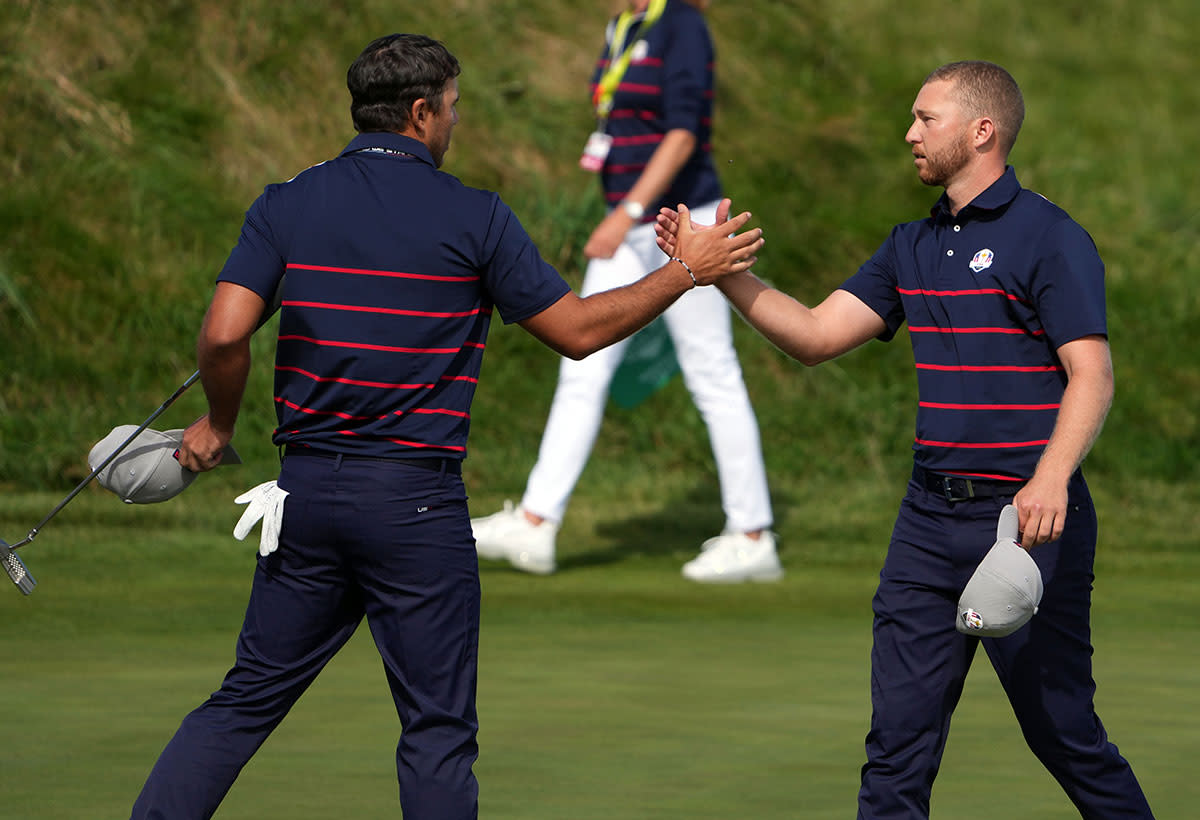
The American Team is Right Where it Wants to Be After a Somewhat Surprising Morning at the Straits
SHEBOYGAN, Wis. — The Americans did something unusual at Friday’s foursomes session at the Ryder Cup: play well. They sit at 3–1 with their stronger event, fourball, still to come.
The U.S. has led after the first session in the past three Ryder Cups, but those have all been in the fourball format. The Europeans have crushed the Americans in foursomes (alternate shot) recently, going 18½–5½ in the last three Ryder Cups en route to winning two. But most of that annihilation came in afternoon play, and in 2012, the last time the Ryder Cup opened with foursomes on Friday and Saturday, the Americans went 5–3. U.S. captain Steve Stricker, hoping there was something to that, scheduled foursomes for 7:05 a.m. both days, leaving his team’s strength for the afternoons.
“Stats have shown over the years that that's a better format for us,” he said on Thursday.
Because this is golf, the most obvious American pairing — Justin Thomas and Jordan Spieth, who have been friends since elementary school, both play the same ball (Titleist Pro V1x) and went 3–1 together in 2018 — was the only one that lost.
They went up with a birdie on No. 2, and exhibited a little gamesmanship on No. 6 when they refused to concede a 2-foot putt, but Jon Rahm and Sergio Garcia came charging back.
Spieth made the shot of the morning on No. 17, leaning off the side of a cliff, so far in the rough that he had to jump up and down to try to get a look at the green.
In the time it took him to regain his balance afterward, falling and then running 20 yards down to Lake Michigan and pulling up just before the water, his ball dropped 3 feet shy of the pin. But Thomas, considered the team’s stalwart coming in, had an off morning. He capped it by sending their birdie putt past the hole and the Europeans took the first point of the day, 3 and 1.
This is the golf event that requires the most teamwork, and the Americans often seem uncomfortable with that. European captain Padraig Harrington speculated this week that his players have an advantage in alternate-shot play because they do it as children.
“I was brought up playing foursomes,” Harrington said. “Played it a lot in amateur golf, many in my team have. It's not really alien to us. It's certainly somewhere that I don't think — because it's not so alien to us, we don't read that much into it. I think sometimes when people haven't played it, they can over-complicate it. … It's just two guys playing a golf ball around the place. It's not that difficult when you're brought up playing it.”
Stricker faced a difficult choice when it came to the pairings. He set up the course to reward long hitters, but his longest hitter, Bryson DeChambeau, makes a challenging teammate: He plays slowly, thinks differently and sometimes rankles the other Americans. DeChambeau said this week he felt confident playing foursomes, but Stricker sat him on Friday morning.
“You look for the guys who embrace [alternate-shot play],” Stricker said. “That's the important part is some guys are a little bit — they don't care for that style of play. Other guys want to play it. It depends on the player and it's up to us or our job to try to figure out those guys and try to pair the games together that make the most sense.”
One person who might have been expected not to care for that style is Brooks Koepka, who brought up twice in his pre-tournament press conference that he never made a Junior Ryder Cup or Walker Cup team. He never played alternate-shot until his Ryder Cup debut in 2016 at Hazeltine. But he insisted that he enjoys it.
“It's fun,” he said. “It's different. It's just tough to kind of build a rhythm. You hit one good shot and you're going to wait 15 minutes before you hit the next one.”
He handled the waits well on Friday, pairing with former Florida State teammate Daniel Berger to beat Lee Westood and Matt Fitzpatrick, 2 and 1. Dustin Johnson and Collin Morikawa beat Paul Casey and Viktor Hovland, 3 and 2.
The most attention-grabbing result came in the fourth match, which pitted Ryder Cup rookies Patrick Cantlay and Xander Schauffele against veterans Rory McIlroy and Ian Poulter. Not until No. 10 did McIlroy and Poulter even win a hole, with a birdie to Cantlay's and Schauffele’s par. After the Americans’ second shot on No. 15, the Europeans recognized all hope was lost and conceded the match, at 5 and 3.
Fairly or unfairly, two big questions hovered over the Americans heading into the Ryder Cup: Do they like each other? And do they like the event? Four hours into it, everyone appears to be having a fine time.